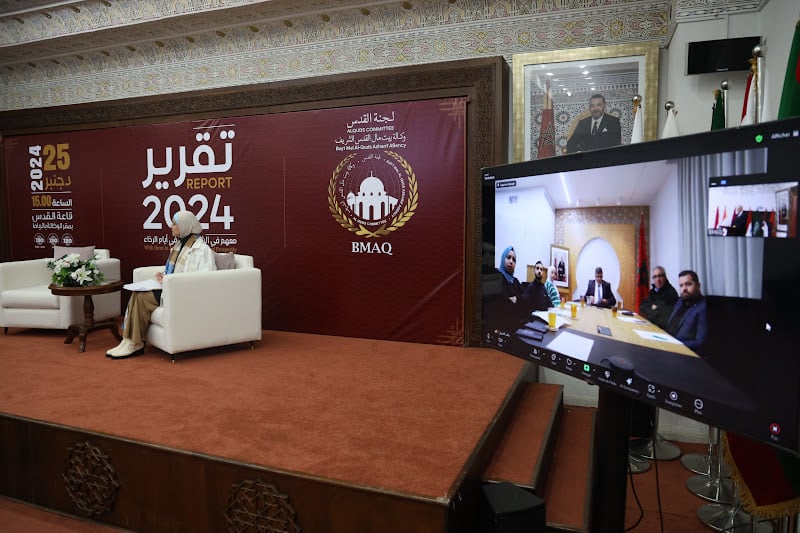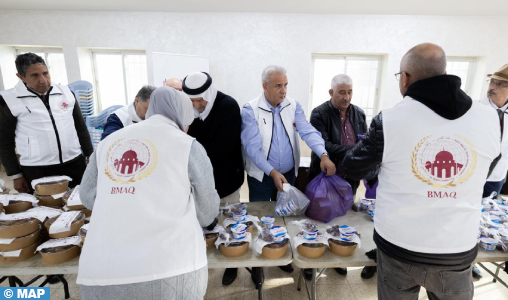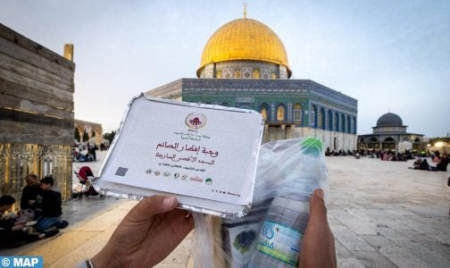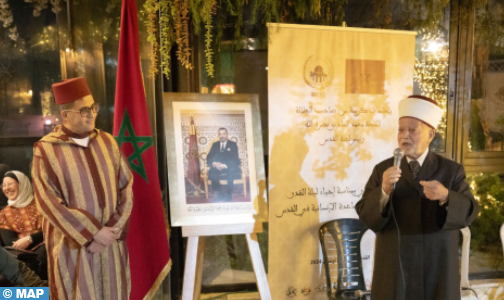Bayt Mal Al-Quds Agency, the executive arm of the Al-Quds Committee, Chaired by King Mohammed VI, invested $4.2 million in 2024 in projects and programs supporting the Palestinian people.
According to the Agency’s 2024 annual report, the implemented projects were distributed across various sectors, with 31% allocated to social assistance programs, 19% to arts, heritage, and cultural industries, as well as 18% to childhood, youth, and sports programs. Furthermore, 14% was invested in supporting Palestinian startup businesses through the Renewal and Innovation Project Incubator.
The report further highlights additional achievements in education, which received 5% of the funds, human development projects (4%), and health programs, including prevention and medication initiatives (1%). Moreover, the agency allocated an exceptional budget of nearly $400,000 (9%) to assist the education system in Gaza. This initiative, implemented under the Royal Directives of His Majesty King Mohammed VI, called for the provision of urgent humanitarian aid to the distressed Strip.
This budget benefited Al-Azhar University in Gaza by providing registration grants for 318 students from the King Hassan II College of Agricultural and Environmental Sciences, issuing certificates for 40 graduates, and equipping the university with cloud servers and a distance learning platform.
Additionally, the report highlighted grants awarded to eight Gaza students to continue their studies in Morocco at the Hassan II Institute of Agronomy and Veterinary Medicine in Rabat, specializing in veterinary medicine and animal production.
The report further emphasized the major humanitarian operation ordered by King Mohammed VI during Ramadan 1446 AH. This operation provided critical aid to Palestinian families in Gaza and Jerusalem, symbolizing Morocco’s unwavering solidarity with the Palestinian brothers.
The Agency oversaw this operation in Jerusalem by distributing 2,200 food baskets, benefiting approximately 3,000 families in Jerusalem, and served 30,000 meals to fasting individuals at Al-Aqsa Mosque and residents of the Old City, shelters, and hospitals. The report also noted that aid was extended to the Shuafat and Qalandiya camps, as well as to the Tekke in villages of the Jerusalem Governorate, including Al-Issawiya and Nabi Samwil.
To set its priorities in alignment with its mandates, competencies, and available resources, the Agency draws on the reports of the “Arribat” Observatory, which is affiliated with the Agency and was inaugurated in Jerusalem in November 2021. These reports were prepared by a team of researchers and specialists, the report underscores. In 2024, the Observatory issued 17 reports focusing on monitoring the exceptional situation in Al-Aqsa Mosque and Jerusalem and its implications for security, the movement of people and goods, and the psychological well-being of the Palestinian population. These reports highlighted the direct and indirect impacts of the war on Gaza and the events in the West Bank.
As for the economic and social conditions, the Observatory’s indicators remained, overall, concerning in 2024, as they were in 2023. This is due to the continued rise in the cost of living and housing, increasing unemployment rates, and the widening scope of poverty, among other indicators that have compounded the sense of hopelessness among generations of Palestinians in Jerusalem.
The Agency’s managing director Mohamed Salem Cherkaoui said that Bayt Mal Al-Quds Agency continued its action on the field in 2024, carrying out these numerous programs and projects thanks to its teams of Moroccan and Palestinian executives, despite difficult security challenges.
He noted that funds earmarked for social aid and human development accounted for 35% of project funding this year, with the aim of supporting large sections of Palestinian society affected by the wave of layoffs of Arab workers in Israel, restrictions on the mobility of people and goods, and the repercussions of the war in Gaza on the trade, tourism, and services sectors.
This situation is likely to continue impacting the lives of Palestinians, who aspire to return to a normal life, particularly in the Gaza Strip, he regretted, noting that hospital centers and facilities in Al Quds and the West Bank could be particularly busy if the crossings were to reopen for people from the Gaza Strip.



